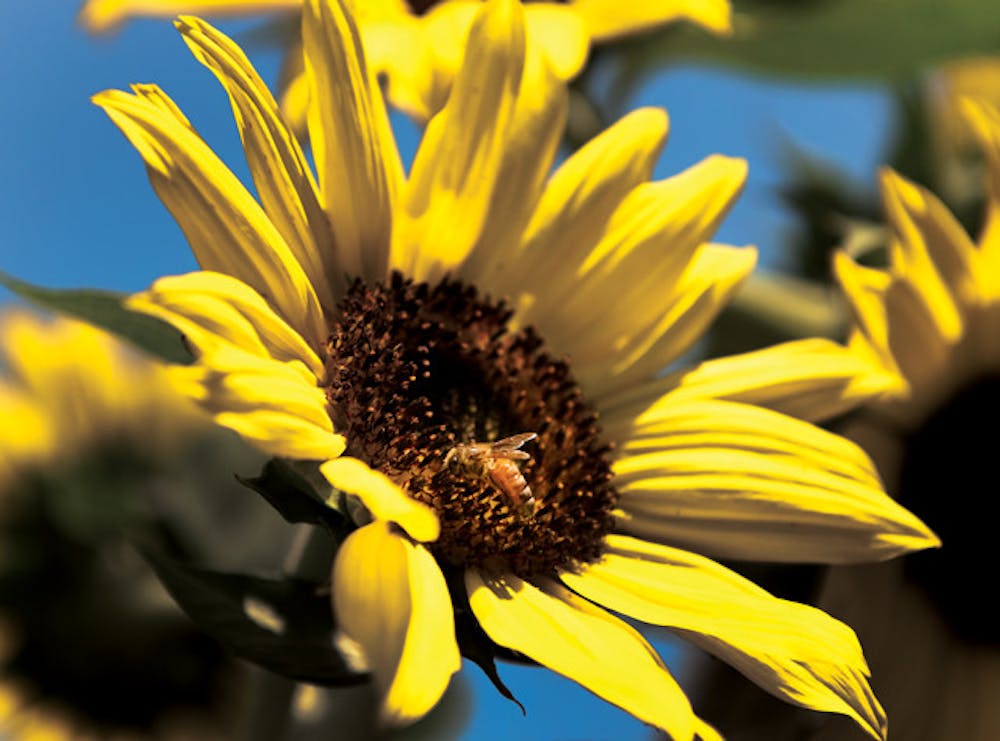Amid a roaring buzz and clouds of bees, Wayne "Chappie" McChesney sets to work.
He looks through one hive after another, making sure his "ladies" are doing OK.
Small-scale beekeeping has been his passion since he was 7. And he does it not only because he loves it, but because he thinks it's important.
"It's not about money, people ask me why and I tell them it's about education," he said.
McChesney is one of more than 1,650 registered beekeepers in Florida. A number that has been on the rise for the last few years.
According to McChesney, education has been the driving force behind people becoming small-scale beekeepers. McCheseny and others like him have been teaching people about the value and joy of beekeeping, in order to help save the shrinking population.
Bees have been declining in the U.S. for many years, and McCheseny said the best way to save them is through education.
A registered beekeeper is anyone with five or more hives who goes through an inspection from the apiary office of the Department of Agriculture. But most of those beekeepers are still harvesting honey, either for personal use or for sale locally, which has resulted in a 20 percent rise in honey production, according to the Department of Agriculture.
Which is an added bonus of more beekeepers.
"I try to educate people as much as I can," McChesney said.
A retired veteran, McChesney has been setting up beekeeping clubs all over North Central Florida. He also teaches at the University of Florida's Bee College, a weekend seminar about bees and their keeping.
If the public had a better idea of what bees do for people, they may not be so eager to spray pesticides and exterminate bees, he said.
"I hope to set up domino effects, with people educating each other."
Jeanette Klopchin, who is the lead research technician and laboratory manager at the University of Florida Honey Bee Research and Extension Lab, said the number of registered beekeepers is on the rise.
"The private beekeepers are supplementing the number of bees lost each year (to disease and parasites), helping boost numbers even if it's not directly through the commercial sector," she said.
Klopchin said that the bee-keeping programs at the research lab, including the Bee College and the Master Beekeeper training program, which is part of the Entomology Department at UF, have reached more than 2 million people since it began four years ago.
"We do everything we can to help people understand bees, we pass on what we learn to them."
The Bee College offers a weekend course, for a small fee, that teaches them everything they need to know about starting out as a beekeeper. Guest speakers and researchers teach the classes, giving advice and tips on how to properly care for bees.
McChesney also brings out speakers and scientists to bee club meetings for those who cant attend the Bee College, because some people either cant spare the weekend or don't have the funds to attend, he said.
"All of those people at the College are great, they do nothing by try and help," he said.
Tom Dowda, who retired after 30 years as an apiary inspector for North Florida, agrees with McChesney.
Dowda now works at Dadant and Sons Inc. in High Springs, Fla. Dadant is one the largest retailers for beekeeping supplies in the country.
The store also holds a bee day every month, which brings curious people in to learn and but start-up kits.
With the decline of feral and commercial bee colonies in the U.S., the small-scale beekeepers, people with gardens and just a few hives kept for fun and not profit, have been one of driving forces behind the survival of the European Honey Bee, said Dowda.
"Interest has grown. The commercial side bringing their problems to the media has brought it to the interest of the public."
Citing that, Dowda also said that organic and home gardening has given rise to the awareness of the public to the value of bees. Without the bees there would be no pollination, and hence no fruit or vegetables come harvest in peoples home gardens.
A co-worker of Dowda's, 20-year-old Ethan Presnell, also mentioned that when the First Lady Michelle Obama added bees to the White House garden, there was a huge spike in people's interest.
"We get a lot of new customers all the time, thanks to people like Chappie and the (educational) programs we have here," Presnell said.
So while there may be a decline in the population of commercially managed bee population, the interest and use of bees for the public is on the rise. Thanks to education and the understanding of the resource that the bees represent.
Contact: Chappie McChesney, (386) 462-2637
http://alachuacountybeekeepersclub.ning.com/






